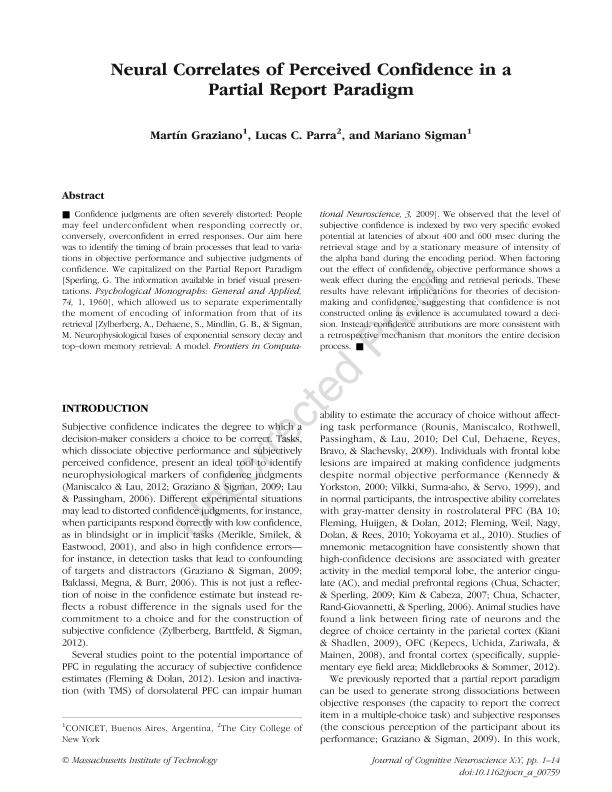Artículo
Neural correlates of perceived confidence in a partial report paradigm
Fecha de publicación:
06/2015
Editorial:
M I T Press
Revista:
Journal Of Cognitive Neuroscience
ISSN:
0898-929X
Idioma:
Inglés
Tipo de recurso:
Artículo publicado
Clasificación temática:
Resumen
Confidence judgments are often severely distorted: People may feel underconfident when responding correctly or, conversely, overconfident in erred responses. Our aim here was to identify the timing of brain processes that lead to variations in objective performance and subjective judgments of confidence. We capitalized on the Partial Report Paradigm [Sperling, G. The information available in brief visual presentations. Psychological Monographs: General and Applied, 74, 1, 1960], which allowed us to separate experimentally the moment of encoding of information from that of its retrieval [Zylberberg, A., Dehaene, S., Mindlin, G. B., & Sigman, M. Neurophysiological bases of exponential sensory decay and top–down memory retrieval: A model. Frontiers in Computa-tional Neuroscience, 3, 2009]. We observed that the level of subjective confidence is indexed by two very specific evoked potentials at latencies of about 400 and 600 msec during the retrieval stage and by a stationary measure of intensity of the alpha band during the encoding period. When factoring out the effect of confidence, objective performance shows a weak effect during the encoding and retrieval periods. These results have relevant implications for theories of decision-making and confidence, suggesting that confidence is not constructed online as evidence is accumulated toward a decision. Instead, confidence attributions are more consistent with a retrospective mechanism that monitors the entire decision process.
Palabras clave:
Subjective Confidence
,
Consciousness
,
Eeg
Archivos asociados
Licencia
Identificadores
Colecciones
Articulos(IEGEBA)
Articulos de INSTITUTO DE ECOLOGIA, GENETICA Y EVOLUCION DE BS. AS
Articulos de INSTITUTO DE ECOLOGIA, GENETICA Y EVOLUCION DE BS. AS
Citación
Graziano, Martín; Parra, Lucas C.; Sigman, Mariano; Neural correlates of perceived confidence in a partial report paradigm; M I T Press; Journal Of Cognitive Neuroscience; 27; 6; 6-2015; 1090-1103
Compartir
Altmétricas




